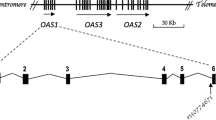Abstract
Systemic lupus erythematosus (SLE) is a prototypic autoimmune disease with complex genetic inheritance. Genetic association of signal transducer and activator of transcription 4 (STAT4) with SLE susceptibility has been convincingly established in multiple populations including Asians, whereas studies of genetic relations between STAT4 polymorphisms and subphenotypes of SLE were rarely conducted. In this study, we selected Chinese female population and investigated genetic association between a polymorphism of STAT4 gene (rs7582694) and SLE. Furthermore, genetic association tests based on different subsets classified by 11 clinical manifestations were also performed. A total of 675 SLE female patients and 678 healthy controls were enrolled into this study, and SNP genotyping was performed using Sequenom’s MassArray system (Sequenom iPLEX assay). Our study showed strong evidence for genetic predisposition of rs7582694 to SLE (X 2 = 23.7, OR = 0.68, 95% CI: 0.58–0.79, P = 1.13 × 10−6), while no association was observed between rs7582694 and any clinical presentations. The results of our study demonstrated that STAT4 rs7582694 SNP was significantly associated with SLE, and these results were in accordance with previous studies.
Similar content being viewed by others
References
Jonsen A, Bengtsson AA, Nived O, Truedsson L, Sturfelt G (2007) Gene-environment interactions in the aetiology of systemic lupus erythematosus. Autoimmunity 40:613–617
Rahman A, Isenberg DA (2008) Systemic lupus erythematosus. N Engl J Med 358:929–939
Xiang YJ, Dai SM (2009) Prevalence of rheumatic diseases and disability in china. Rheumatol Int 29:481–490
Kim I, Kim YJ, Kim K et al (2009) Genetic studies of systemic lupus erythematosus in asia: where are we now? Genes Immun 10:421–432
Harley IT, Kaufman KM, Langefeld CD, Harley JB, Kelly JA (2009) Genetic susceptibility to SLE: New insights from fine mapping and genome-wide association studies. Nat Rev Genet 10:285–290
Namjou B, Sestak AL, Armstrong DL et al (2009) High-density genotyping of stat4 reveals multiple haplotypic associations with systemic lupus erythematosus in different racial groups. Arthritis Rheum 60:1085–1095
Korman BD, Kastner DL, Gregersen PK, Remmers EF (2008) STAT4: Genetics, mechanisms, and implications for autoimmunity. Curr Allergy Asthma Rep 8:398–403
Bengtsson AA, Sturfelt G, Truedsson L et al (2000) Activation of type I interferon system in systemic lupus erythematosus correlates with disease activity but not with antiretroviral antibodies. Lupus 9:664–671
Lee YH, Woo JH, Choi SJ, Ji JD, Song GG (2009) Association between the rs7574865 polymorphism of STAT4 and rheumatoid arthritis: a meta-analysis. Rheumatol Int 30:661–666
Glas J, Seiderer J, Nagy M et al (2010) Evidence for STAT4 as a common autoimmune gene: Rs7574865 is associated with colonic crohn’s disease and early disease onset. PLoS One 5:e10373
Pykalainen M, Kinos R, Valkonen S et al (2005) Association analysis of common variants of STAT6, GATA3, and STAT4 to asthma and high serum IgE phenotypes. J Allergy Clin Immunol 115:80–87
Rueda B, Broen J, Simeon C et al (2009) The STAT4 gene influences the genetic predisposition to systemic sclerosis phenotype. Hum Mol Genet 18:2071–2077
Korman BD, Alba MI, Le JM et al (2008) Variant form of STAT4 is associated with primary sjogren’s syndrome. Genes Immun 9:267–270
Hom G, Graham RR, Modrek B et al (2008) Association of systemic lupus erythematosus with c8orf13-BLK and ITGAM-ITGAX. N Engl J Med 358:900–909
Harley JB, Alarcon-Riquelme ME, Criswell LA et al (2008) Genome-wide association scan in women with systemic lupus erythematosus identifies susceptibility variants in ITGAM, PXK, KIAA1542 and other loci. Nat Genet 40:204–210
Han JW, Zheng HF, Cui Y et al (2009) Genome-wide association study in a chinese han population identifies nine new susceptibility loci for systemic lupus erythematosus. Nat Genet 41:1234–1237
Yang W, Shen N, Ye DQ et al (2010) Genome-wide association study in asian populations identifies variants in ETS1 and WDFY4 associated with systemic lupus erythematosus. PLoS Genet 6:e1000841
Taylor KE, Remmers EF, Lee AT et al (2008) Specificity of the STAT4 genetic association for severe disease manifestations of systemic lupus erythematosus. PLoS Genet 4:e1000084
Sigurdsson S, Nordmark G, Garnier S et al (2008) A risk haplotype of STAT4 for systemic lupus erythematosus is over-expressed, correlates with anti-dsDNA and shows additive effects with two risk alleles of IRF5. Hum Mol Genet 17:2868–2876
Hellquist A, Sandling JK, Zucchelli M et al (2009) Variation in STAT4 is associated with systemic lupus erythematosus in a finnish family cohort. Ann Rheum Dis 69:883–886
Purcell S, Neale B, Todd-Brown K et al (2007) Plink: a tool set for whole-genome association and population-based linkage analyses. Am J Hum Genet 81:559–575
Jacob CO, Zang S, Li L et al (2003) Pivotal role of STAT4 and STAT6 in the pathogenesis of the lupus-like disease in the new zealand mixed 2328 mice. J Immunol 171:1564–1571
Vieira AR, Avila JR, Daack-Hirsch S et al (2005) Medical sequencing of candidate genes for nonsyndromic cleft lip and palate. PLoS Genet 1:e64
Burfoot RK, Jensen CJ, Field J et al (2008) Snp mapping and candidate gene sequencing in the class I region of the HLA complex: searching for multiple sclerosis susceptibility genes in tasmanians. Tissue Antigens 71:42–50
Edghill EL, Minton JA, Groves CJ et al (2010) Sequencing of candidate genes selected by beta cell experts in monogenic diabetes of unknown aetiology. JOP 11:14–17
Acknowledgments
This work was supported in part by funding from National Science Technology Pillar Program in the Eleventh Five-year Plan (No. 2008BAI59B02, 2008BAI59B03), National Natural Science Foundation of China (No. 30471617, 30640084, 30872331, 81072486). We thank Wei Chen and Feng Cheng of Beijing Institute of Genomics for their helps and suggestions in genotyping and data analysis.
Author information
Authors and Affiliations
Corresponding authors
Additional information
H. Luan, P. Li and C. Cao are co-first authors of this work.
Rights and permissions
About this article
Cite this article
Luan, H., Li, P., Cao, C. et al. A single-nucleotide polymorphism of the STAT4 gene is associated with systemic lupus erythematosus (SLE) in female Chinese population. Rheumatol Int 32, 1251–1255 (2012). https://doi.org/10.1007/s00296-010-1767-9
Received:
Accepted:
Published:
Issue Date:
DOI: https://doi.org/10.1007/s00296-010-1767-9




